We are now in election campaign to we elect deputies or representatives in the European Parliament. The streets are again plastered with election ads. Also the Old World had elections for some political office and had “campaign” with their messages of propaganda to persuade voters.
Vesuvius that destroyed Pompeii, has also given us a lot of information about daily life in a Roman city, for example on the elections that were held every year for some charges of the municipal government.
In 87 B.C. Pompeii became a municipality as most of the cities of Italy and shortly after in the 80- it was colony. This double origin of the inhabitants of Pompeii was reflected initially in the institutions until to be unified.
The old democracies have a big difference with today: they are not universal and therefore very few individuals are involved. The number of electors of Pompeii would be very small. With the city and the surrounding countryside there were an estimated 36,000 people, of which half were slaves; half of the remaining half would be women who did not vote; there were also the children. We may think that they could vote 2,500 people in the city and 5,000 in the field. So we think that family relationships,friendship would be determining.
In cities such as Pompeii they were chosen some charges similar to then of the "urbs", the "city", Rome, with responsibilities relating exclusively to your local office.
Specifically the aediles, like the aediles of Rome and like our present councilors, also annual, and duoviri or more important local magistrates, like the Roman consuls, were elected by the citizens, for annual term.To be Duovir it was necessary to have been before aedile.
The deputies, the aediles, took care of the municipal police, streets, public buildings, water, assigning positions in the market, to raise local taxes and municipal properties leased, etc.. In some inscription they are called "duoviri charged of streets and public and sacred buildings"
The ancient duoviri made the “ordo decurionum”, similar to the Senate, for life, elected by themselves.
The seviri augustales or priests of Augustus, were chosen in turn by the ordo decurionum.
Every five years the quinquenales (for five year) duoviri played local functions similar to the censors of Rome.
It seems that for duoviri it was only two annual candidates, ie, as many as charges. We could raise a question about real democracy in Pompeii, but it bear in mind that to be duunvir, it had to have been before aedile, and only two councilors were elected each year, so the list of possible candidates was very small. So the closest elections were of aedile, Elections would be held in March or April and the term would begin in July.
The vote (suffragium) was expressed in writing (per tabellam) in a wax tablet on which candidate’s name was engraved with a stylus. The tablet was deposited in a box (arca) or basket (cista) in your district, overseen by representatives from other districts, usually three. The process was chaired and supervised by the proposed by the electoral assembly duovirum, generally greatest in old, sitting in the stands (suggestum) assisted by his collaborators, as the specialist Staccioli, RA says in his Manifesti elettorali nell'antica Pompei.
The description corresponds in its entirety to the current process: districts, ballot boxes, ballot papers, agents and representatives, president of the board of elections …
An important element of the process was the electoral propaganda.
We have many testimonies of election posters in Pompeii: the 25,000 inscriptions or graffiti appearing on walls of houses, some on the outside and others inside, tenth, about 2,500 are election posters that provide us a lot and sometimes curious information.
It should be made some general consideration. First such registration implies a certain level and development of reading ability of Pompeian people; some famous paintings and mosaics also reflect the literacy rate.
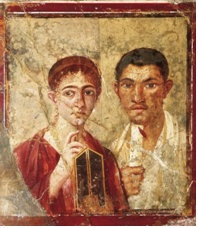 The graffiti, generally well calligraphed, are made by professional sign makers who make any kind of registration; they are as conscious of his art that they sometimes initialed his name. For example a certain Celer reports that "Aemilius Celer, his neighbor, wrote it," and in anticipation that someone erased, he added: "If you have the evil to erase it, I wish something wrong for you." This Celer is the author of other graffiti announcing a gladiatorial show.
The graffiti, generally well calligraphed, are made by professional sign makers who make any kind of registration; they are as conscious of his art that they sometimes initialed his name. For example a certain Celer reports that "Aemilius Celer, his neighbor, wrote it," and in anticipation that someone erased, he added: "If you have the evil to erase it, I wish something wrong for you." This Celer is the author of other graffiti announcing a gladiatorial show.
CIL 04, 03775
Neighbours beg you to elect Lucius Statius Receptus duumvir with judicial
power, a worthy man. Aemilius Celer wrote this, a neighbour. You jealous
one who destroys this, may you fall ill.
L(ucium) Statium Receptum
IIvir(um) i(ure) d(icundo) o(ro) v(os) f(aciatis) vicini dig(num)
scr(ibsit) Aemilius Celer vic(ini)
invidiose
qui deles
ae[g]rotes
Most are written in red and black. They are written into capital (uppercase) letter and in italics and reflect spoken Latin, Vulgar Latin as some call …
They are usually very formulaic and respect a formula that is repeated constantly (also current ads are very formulaic and do not vary in its general form of a campaign to another, they do not lack in, for example, VOTE …). That is, in general they are very monotonous and uncreative and they use abbreviations profusely, O for “oro, orant (to beg); V for vobis (to you), F for faciatis (made); ROG for ROGo, rogant; DRP for Dignum rei publcae (ideal for Public Affairs).
The general formula is: name of the candidate in the accusative and office which is demanded in abbreviated, AED (ILEM), II VIR (um). Then the name whose proposes or endorses asking the vote in nominative and Formula ROG (at / ant, propose, ask, or O (ro) V (os) F (aciatis) (I ask you to do). The indicate in general way:
Mrs so-and-so asks you to do (duunvir) to Mrs. So-and-so ...
Ever they have a little more originality, as in the following example where the message is interspersed between the letters of the candidate (CIL, IV 07868):
I beg you to elect Lollius, suitable for roads and public and sacred buildings.
Lollium d(ignum) v(iis) a(edibus) s(sacris) p(ublicis) o(ro) v(os) f(aciatis)
L OD LV LA IS VP M OVF
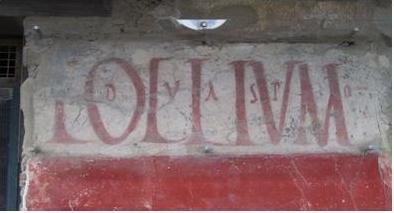
Generally each poster is dedicated to one a candidate and rarely both names appear.
The posters are not cleared after each campaign, but they are accumulated on each other; sometimes the old posters are covered with a layer of plaster to register new top of them. Some advertisements correspond to the time of creation of Pompei as a Roman colony in 80 BC, but most correspond to the last years of the city, between the earthquake of 62 DC and the eruption of Vesuvius in 79 AD that destroyed the city.
Considering that some are superimposed on other advertisements that were not deleted, it has been tried to set a timeline of the candidates, but it is a very difficult and challenging task.
Some have certainly been directly commissioned by the candidate concerned, other are given by members of the family, others show anonymous support or of certain social groups (fullers, dyers, millers, poultry, harvesters, carpet makers or matting makers, ointments vendors, fishermen , muleteers, onion sellers, jewelers, hairdressers, barbers, bakers, hatters, ..),or religious brotherhoods (devotees of Venus, devotees of Isis, …); or groups of friends (ball players, checkers players, comrades, friends amphitheater shows, the workers and the poor, prostitutes …); or of certain influential people. So one resorts to the authority of Suedius Titus Clemens, agent of the emperor Vespasian. Naturally, the owner of the building in which the graffiti appears would support the candidate.
CIL 04, 01147:
I ask that you elect aedile Aulus Vettius Firmus, worthy of public things, ask you to elect him; ball players elect him.
A(ulum) Vettium Firmum / aed(ilem) o(ro) v(os) f(aciatis) d(ignum) r(ei) p(ublicae) o(ro) v(os) f(aciats) pilicrepi facite
CIL IV 09932
Modestus for aedile (city councillor). The underprivileged and the poor elect him.
Modestum aed (ilem)[prole]tari et pauper[es] facite
Note: others read [unguen] tari (i) perfumers
CIL, IV 00202
All sellers of apples with Helvius Vestalis propos Marcus Holconius Priscus for duunvir (major) (II vir) in charge of justice (iure dicundo)

M HOLCONIVM
PRISCVM .II VIR . I. D.
POMARI. VNIVERSI
CVM HELVIO VESTALE ROG…
M(arcum) Holconium / Priscum IIvir(um) i(ure) d(icundo) / pomari universi / cum Helvio Vestale rog(ant)
In any case there are no formal political parties and others are who ask to vote for the candidate.
Ever, few times, the name of a woman appears, as for example Tedia Secunda, who turns out to be the grandmother of Lucius Popidius Secundus, with him she appears next to. Anyway, grandmothers before as now have a weakness for their grandchildren and this would be proud of the political career of his grandson.
(CIL 04, 07469)
I beg you to make Lucius Popidius Secundus aedile. His anxious grandmother Tedia Secunda ask it and he did him.
L(ucium) Popi[dium] S[ecun]d[u]m aed(ilem) o(ro) v(os) f(aciatis) / Taed[i]a secunda cupiens avia rog(at) et fecit
On several occasions the girls of a tavern are the support for a candidate, in jest or seriously, we do not know …
CIL IV 07863
[Make] C.Lollius Fuscus duumvir for looking after the roads [and] the sacred [and] oublic buildings. Aselina’s [girls?] ask you, not without Zmyrna.
Note: Aselina’s girls would be prostitutes.
C(aium) Lollium / Fuscum IIvir(um) v(iis) a(edibus) s(acris) p(ublicis) p(rocurandis) / Asellinas(!) rogant(!) / nec sine Zmyrina
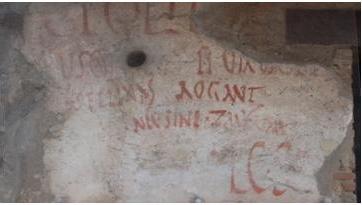
It is striking the support to candidate of a group of women who just do not vote or participate in politics.
Sometimes irony can be glimpsed, such as when certain not advisable groups seem to show support for a candidate or maybe it's also an example of counter-propaganda. See below the comment to a graffiti referred to Helvius …
The names of four women, Aselina, Egle, Smyrna and Mary, who may belong to the same inscription, appear on the outer wall of a tavern in Via dell'Abbondanza; they probably are waitresses or prostitutes. Maybe it's the maids; for example, Greek names Egle and Smyrna seem slave name; maybe some horny put the names of the maids next to the electoral advises jokingly completing the ad. Perhaps the interested Gayo Juiio Polybius, did not like it because it appears erased the name of Smyrna with a layer of lime, as if he wanted to remove that support … or maybe i was the concerned girl who covered it.
CIL IV 7862
I beg you to elect Cn. Helvius Sabinus aedile, worthy of public office. Aegle
asks this.
Cn(aeum) Helvium Sabinum / aed(ilem) d(ignum) r(ei) p(ublicae) o(ro) v(os) f(aciatis) Aegle rogat
CIL IV 7866
I beg you to elect Cn. Helvius Sabinus aedile, worthy of public office. Maria
asks this.
Cn(aeum) Helvium Sabinum / aed(ilem) d(ignum) r(ei) p(ublicae) o(ro) v(os) f(aciatis) Maria rogat
So too it has been deleted the name Cuculla from the inscription, perhaps because the candidate did not like him or his "election committee":
CIL IV 07841
Caius Julis Polybius for duunvirum. Cuculla beg it.
C(aium) Iulium Polybium. (duo)vir(um) Cuculla rog(at)
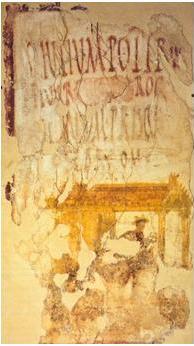
Marcus Cerrinius Vatia is supported by numerous individuals and groups such as pomari or apple sellers, (CIL, IV 00149), or by the saccari or boots bags (CIL, IV 00274), or by the campanians (CIL, IV 00480), or by coronarii, the manufacturers of crowns (CIL, IV 00502) and by all seribibi or "drinking late into the night" (CIL, IV, 00581), which I reproduce below:
The late drinkers all ask you to elect Marcus Cerrinius Vatia aedile. Florus
and Fructus wrote this.
M(arcum) Cerrinium / Vatiam aed(ilem) o(rant) v(os) f(aciatis) seribibi / universi rogant / scr(ipsit) Florus cum Fructo
Note: some commenter thinks that the names of the clerks are fictitious.
And they who sleep with … (do not know with whom):
CIL IV 00575
All those asleep and Macerius ask for Vatia as aedile.
Vatiam aed(ilem) rogant / Ma cerio(m!) dormientes / universi cum / [
And thieves:
CIL IV 00576
The little thieves ask for Vatia as aedile.
Vatiam aed(ilem) furunculi rog(ant)
And fugitive slaves
CIL IV 07389
Marcus Cerrinius Vatia. All fugitive slaves.
[M Cerrinium Vatiam?] drapetae omnes
They all seem examples of counter-propaganda or unwanted support.
It is funny one in which the artist adds some harvest
CIL IV 07621
Caius Julis Polybius for aedile for looking after the roads [and] the sacred [and] public buildings. Lantern carrier, hold the ladder.
C(aium) Iulium Polybium / aed(ilem) v(iis) a(edibus) s(acris) p(ublicis) p(rocurandis) // lanternari tene / scalam.
There is not program or campaign promises; it seems to prevail the moral status of the candidate. Sometimes the initials DRP (Dignum Rei Ppublicae) and adjectives related to your dignity and honesty appear. "Dignus" actually means “suitable, adequate”. Other laudatory adjectives that can be used sometimes are virum bonum (good man), virum probum (honest man); iuvenem (Young), iuvenem probum (honest young) adulescentem probum (honest teenager), verecundissimum (very respectable), adding so any reason to vote for him.
CIL 04, 06626
If integrity in life is thought to be of any use,
This man, Lucretius Fronto is worthy of great honour.
Si pudor in vita quicquam prodesse putatur / Lucretius hic Fronto dignus honore bono est.
It is said about Gaius Julius Polybius that "shows (or bring) good bread" without knowing if he is the baker or someone who makes a deal of free bread.
(CIL.IV 00429)
I beg you to elect Gaius Julius Polybius aedile. He brings good bread.
C(aium) Iulium Polybium / aed(ilem) o(ro) v(os) f(aciatis) panem bonum fert
It is said about Brutius Balbus that "he does not squander money in town" and this may mean that it is a good manager or that he spends their own money
(CIL, IV 03702):
Brutius Balbus for duumvir. This will save the public purse. Genialis asks it.
Bruttium Balbum // IIvir(um) / hic aerarium conservabit // Gen[ialis] / rog(at)
Casuistry is huge in 2500 ads. I reproduce some more with some curious detail, so:
(CIL, IV, 02887)
If reject Quintius, , sit on a donkey
Quintio(m) si qui recusat, assidat ad asinum”
Note: Unlike most, this does not call for the vote butt announces evils for those who do not provide. With "sit on a donkey" it seems to refer to heavy and constant work with which the asses were circling the mill wheel; to it the poet Catullus refers in his poem 97, v, 10: "et non Pistrino asino atque traditur?" (and is he not sent to the mill as a donkey. It could also mean "to ride on a donkey to serve. derision and mockery. "
CIL, IV, 07791
The youth club of youth of Venus proposes Ceyus Secundus for duumvir in charge of justice
CEIVM SECVNDVM IIV I D
VENERIOSI ROG IVVENEM
Ceium Secundum IIv(irum) i(ure) d(icundo) / Veneriosi rog(ant) iuvenem
CIL, IV, 00346
One of the councilors loves M.Cerrinus, the other is his love. That makes me hate him. He who hates love.
M(arcum) Cerrinium / aed(ilem) alter amat alter / amatur ego fastidi(i?) / qui fastidit amat
Note: We remember the famous poem 85 of Catullus ' Odi et amo "," I hate and I love "
There are several candidates on more than a hundred ads. I will make some consideration on one of them, Cnaeus Helvius Sabinus, appearing in at least 140 times and so we learn more details about this political propaganda.
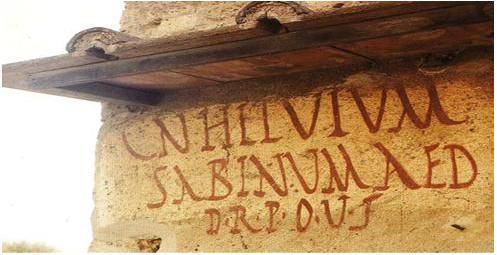
(CIL 4, 9928):
I beg you to elect Cn. Helvius Sabinus aedile, worthy of public office.
CN HELVIVM
SABINVM AED(ilem)
D R P O V F
Cn(aeum) Helvium / Sabinum aed(ilem)/ d(ignum) r(ei) p(ublicae) o(ro) v(os) f(aciatis)
As I said, he appears in 140 entries. In most he figures with three names Cn (aeum) Helvium Sabinum; 15 times as Helvium Sabinum; 8 as Cnaeum Helvium; in 6 as Helvium; 1 as Cnaeum Helvium Sabinum Arieh. We conclude, therefore, that is a well known character and easily identified by citizens.
In the majority of cases he appears only as a candidate; on 6 occasions with another candidate who appears only once for aedile also ; he appears in the rest for duumvir.
In most times it appears the office that he wants, aedilem (over 100); once duumvir (IIvirum); he only appears in a dozen with a name of the three without more data, so that the voter should know what position he wants.
Only twice the functions as aedile are specified: the charge of sacred and public buildings (temples):
I beg you make him aedile for looking after the sacred and public buildings
Aed(ilem)d(ignum) r(ei) p(yublicae) v(iis) a(edibus) s(acris) p(ublicis) p(rocurandis) O(ro) V(os) F(aciatis)
In most, at least half, full or not typical formula is used: D (Ignum) R (ei) P (ublicae) O (ro,-ant) ((or rog (o,-ant) (V ( os) F (aciatis): (more than 60 times). Dignum, dignified, proper, refers to the merits and suitability fotr he position.
On four occasions he is called virum bonum (good man), in five virum probum (honest man); one time iuvenem (young) and twice iuvenem probum (honest young), thus providing a reason why that he should be elected.
In most times the ad is anonymous, it was probably at the behest of the candidate himself.
On more than 34 occasions he is proposed by others:
– By individuals, sometimes accompanied by his families (suis) or by his wife (sua) Aegle (twice); Popidi (us), Caprasia, Balbus, Iunia, Thyrsus, Parthope and Rufino, Crescens (twice), Vesonius Primus, Infantio, Astylus, Astyle, Pacuvius, Lorei, Maria.
– By individuals with family: Equitius cum suis, Primus cum suis, Infantio cum suis, Amandio cum sua , Epidius cum suis, Porcellus cum suis, Biri cum Biria.
– By his neighbors: vicini (twice)
– By groups: urbulanenses, Poppaei, Aliari, Isiaci (devotees of Isis), cum gallinariis Hermes (Hermes with caregivers of hens), pistores cum vicinis (twice): bakers with its neighbors, Masculus cum codatis.
The latter, Masculus cum codatis, has been object of special attention. The graffiti, CIL IV 7240 says:
Elect Gnaeus Helvius Sabinus aedile; he is worthy to manage the community. Masculus and all those who have a tail you recommend him.
CN HELVIVM
SABINVM AED D R P O F
MASCVLVS CVM CODATIS VBIQ
Cn(aeum) Helvium / Sabinum aed(ilem) d(ignum) r(ei) p(ublicae) o(rat) f(aciatis) / Masculus cum codatis ubiq(ue).
Some commentators, such as Della Corte, reviewers that the graffiti may refer to a brotherhood of devotees of the god Priapus whose Masculus would be their chairman. It is interpreted in any case, as an example of unwanted support ads, which discredit a candidate or just a bad joke.
Anyway, they are 2500 graffiti which are valuable documents to know one aspect of the social and political life of a Roman city of the first century. Apparently there are many differences with the world today; in the background there are not many. The purpose or object and form of these messages are actually very similar to ours: it is to persuade the voter to choose a particular candidate usually without further additions. Sometimes some data based on the candidate's qualities and sometimes the support of certain social groups is reflected, as now it is offered.

